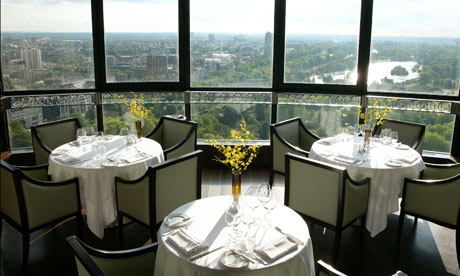
Galvin at Windows restaurant, The Hilton, Park Lane, London. Photograph: Mark Whitfield
I can't remember the last time I chose to eat in a hotel restaurant. Controlled by accountants, designed by committee, cravenly crowd-pleasing and a mere add-on to the main business, most can be placed on a sliding scale that starts at very bad and tops out at boring.
The feel of most hotels doesn't help. The hustle, the bustle, the business suits in the bar, it all feels like a conveyor belt, a commercial terminus where food is but one route in and out. Surely what you want to feel in a restaurant is some personality, some sense that the place is individual, unique, a loved living entity. Which, in a five-star hotel, is mighty difficult to achieve.
Nico Ladenis came up with one solution when he moved to the Grosvenor House Hotel in 1992. He insisted on an unusual set-up. Hotel guests weren't able to come down from their rooms and walk straight in to his restaurant. Instead, they had to go outside on to Park Lane and use the Chez Nico entrance like everyone else. In a way, this was typical of the man: Ladenis didn't do compromise. He was notorious for chucking a wobbly if a guest asked for salt or had the temerity to order a second G&T. He even ordered customers to sit up straight.
By making sure his restaurant was physically separated from its hotel home he demonstrated the attitude that many people, chefs and diners, have to hotel restaurants. As Jeff Galvin, who worked at Chez Nico, recalls: "a fence went up around the restaurant," and there was, he says, a kind of "bravado that you don't really need hotel guests."
With his brother Chris, Jeff Galvin now runs the Michelin-starred restaurant at the Park Lane Hilton and has just opened La Pompadour at Edinburgh's Caledonian. Galvin takes a very different view to Ladenis: he sees having hundreds of potential customers in the same building as a boon. The Galvins have direct control over how their restaurants look, and after agreeing food margins and labour costs with Hilton, they are left to it on everything from staffing to sourcing. Galvin has lived in Edinburgh for two months, not because Hilton demanded it, but because he wants the kitchen to shine.
Whether it does remains to be seen. As does whether Angela Hartnett can make a fist of her new restaurant project at Lime Wood. Nathan Outlaw, meanwhile, is about to launch a second Seafood & Grill restaurant in Knightsbridge, at the Capital. Outlaw told Restaurant Magazine that he will be ferrying fish up from Cornwall, visiting weekly to oversee the kitchen (to be run by Pete Biggs, who has worked for Outlaw for 10 years) and, generally, making sure that this hotel consultancy does nothing to diminish his reputation. Boldly, Outlaw's team will look after the complete food and beverage operation at the hotel. Chefs often see cooking breakfast and delivering room service as an unwelcome distraction, but, says Galvin, it can be done: "We did look at the Waldorf in the Strand, to take over the whole F&B. I wouldn't have a problem doing it. It's just getting the circumstances correct."
Much as I like the idea of Nathan Outlaw scrutinising my kippers, none of this makes me question my stance that hotel restaurants are best avoided. The Galvins have proven it is possible to create a restaurant that resonates beyond the lobby, but it remains so rare as to be statistically irrelevant. Heston Blumenthal's Dinner, for instance, serves excellent food but feels swanky and charmless in comparison to the odd, homely Fat Duck.
In budget city hotels the food is, invariably, manufactured catering meh made available only because the hotel knows a good proportion of guests - too lazy or unimaginative to eat elsewhere - will demand it and pay through the nose for it. Move up a level and you find salaried chefs with little real control going through the motions, or hotels attempting and failing to disguise their cynicism beneath a veneer of celebrity glamour. It barely matters to Marco Pierre White, I imagine, professionally or existentially, how much or how little his magic rubs off on Sanguine Hospitality's branded MPW restaurants. But the meal I ate at Liverpool's Hotel Indigo earlier this year bore about as much relation to MPW in his pomp as this blogpost does to Joseph Roth's best feuilletons.
On the plate too, even good hotel restaurants can feel coolly calculated: an attempt to bag a star and boost commercial profiles rather than an act of uninhibited creativity. I ate (some) very nice food at Brockencote Hall recently, but will it ever be the scene of truly risky, revelatory cooking? I doubt it. Perhaps that was what was bugging Nico Ladenis, the thought that even the greatest hotel restaurant will always feel second best. Or do you know different?
Source: http://www.guardian.co.uk/lifeandstyle/wordofmouth/2012/oct/01/hotel-restaurants-five-star-food
grizzlies bronx zoo crash april 30 wwe extreme rules 2012 vontaze burfict jimmy kimmel amzn
No comments:
Post a Comment
Note: Only a member of this blog may post a comment.